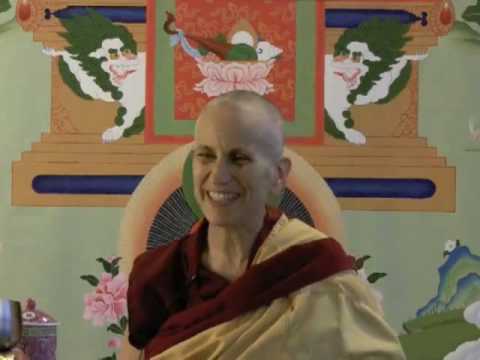Practicing in a group retreat
Part of a series of Bodhisattva's Breakfast Corner talks given during the Green Tara Winter Retreat from December 2009 to March 2010.
- While in group retreat, the group functions as a community
- Every person in the group is important to the community
- The feeling of community can give a lot of strength and support to the practice
Green Tara Retreat 002: Community retreat (download)
One thing that is good to understand when we’re doing retreat is that we aren’t just this diverse group of individuals all doing our own things, but rather we function very much as a community. We come to the retreat with the mind of giving support to the other people who are on retreat and also being bolstered by their support. One of the nice things about doing retreat in a group is that it becomes very easy to keep your meditation schedule.
On your own, if you’re in a cabin by yourself and the alarm rings in the morning, you think, “Well, I’ll sleep a little bit longer. It won’t matter.” But when you’re doing group retreat, everyone’s getting up so you don’t have to think about that. You get up because you know that you’re going to be missed in the hall and that you’re a part of this group energy of all of us doing it together. It really helps you. You just hear the bell and know that everybody’s going to do session, or everybody’s going to study, or everybody’s eating, and so you just follow along with it. You don’t have to think about, “Well, what do I feel like doing?” because that is a real big problem.
Thinking about “What do I feel like doing” sometimes can really get us into trouble. Most of our life we’ve thought about, “What do I feel like doing?” or we’re chatting with a friend, or getting involved in a distraction, or whatever. As soon as we think, “Well, do I feel like going to the meditation session?” then our mind is going to come up with a lot of reasons why not to. Whereas, if we just set that whole question aside (because it isn’t necessary when we have a group schedule) of what I feel like doing, it just isn’t even on the radar. When it comes time to do something while on group retreat we just do it, so the schedule, the meditation, and everything, becomes very, very easy. This hindrance of our own preferences gets diminished. It’s really helpful for retreat.
Also there is this thing of really feeling, “My presence counts. What I do in this retreat influences everybody else. I’m not just influencing myself.” If I skip a session, or if I’m sitting here moving like this in a session, or clicking my mala beads really loud, or I’ve just got to get up and leave the hall, things like this—we then realize, “Wait a minute! I’m not this single individual, but my actions affect the other people around me.”
We then start to consider all of this: it gives us a lot of strength to sometimes do things that we don’t think we can do. It’s very helpful. The group support is important. We give our energy and we receive our support.
Most people will be in the hall. The first two weeks Jampel will be cooking, then Kari who’s done retreats here before. She will be coming and cooking for about two and a half weeks or so. I’ll be doing retreat in my cabin. Even though not all of us are in the hall for every session, we still function as a group and what we do is interrelated with everybody else here.
While doing retreat we may start to think these thoughts. Especially if you’re in the hall, you really feel the kindness of the people in the kitchen. Those are the people whose kindness you should meditate on especially. Whereas our negative mind likes to complain: “There wasn’t enough food,” “They didn’t make what I like,” “The rice isn’t cooked well enough and the noodles are cooked too well,” and, “They use the vegetables that I’m not so fond of and there wasn’t enough of this one,” and, “I really would like a different kind of dessert.”
Our mind can go on and on, and that just disturbs our mind. If we change the mind, and say, “Wow! This person is giving up sitting in the hall in order to cook for me.” We then really feel, “Oh! I owe a lot to this person. Now, my retreat time is due to the kindness of this person. So it’s Jampel, and then Kari, and then Kathleen who will be cooking after that.”
We adjust our mind to see the kindness of everybody in the group. For example, Dallas will be working in the office, just coming to morning and evening sessions, in case you don’t see her in every session in there. But you think, “Wow, it is because of her kindness that I get to do retreat while she’s answering the phone and emails,” as well as Venerable Chonyi who is taking care of when people write to us to say they want to offer us food. She’s writing right back and saying what to offer. So now we have the time to meditate. It is because people are doing these different tasks, and we don’t always see them doing those tasks.
Similarly, some of us have different chores and we clean different things so we’re all contributing in our own way to the benefit of the entire group. It’s important to see things in that way, not like, “Well I had to clean the toilet this week. Why doesn’t someone else clean it next week?” And you know cleaning the toilet really takes a long time! It takes all of three minutes and somebody else can vacuum the floor and that only takes two minutes, but that’s only because you don’t see that vacuuming the floor takes five minutes.
Our mind can easily get into this picky, picky thing of, “Oh, I just have more chores than anybody else. It’s not fair.” Throw that mind out because, again, we’re functioning as a group. Whatever we do is helping the wellbeing of everybody in the group and all the chores we do, whether other people notice them or don’t notice them, are a way of us accumulating good karma by serving people: those who are doing the retreat. Don’t see them as chores and as burdens, but as opportunity to serve and an opportunity to create positive karma. This positive karma is what makes our retreat go well. We have to really hold this kind of group mind.
Venerable Thubten Chodron
Venerable Chodron emphasizes the practical application of Buddha’s teachings in our daily lives and is especially skilled at explaining them in ways easily understood and practiced by Westerners. She is well known for her warm, humorous, and lucid teachings. She was ordained as a Buddhist nun in 1977 by Kyabje Ling Rinpoche in Dharamsala, India, and in 1986 she received bhikshuni (full) ordination in Taiwan. Read her full bio.


